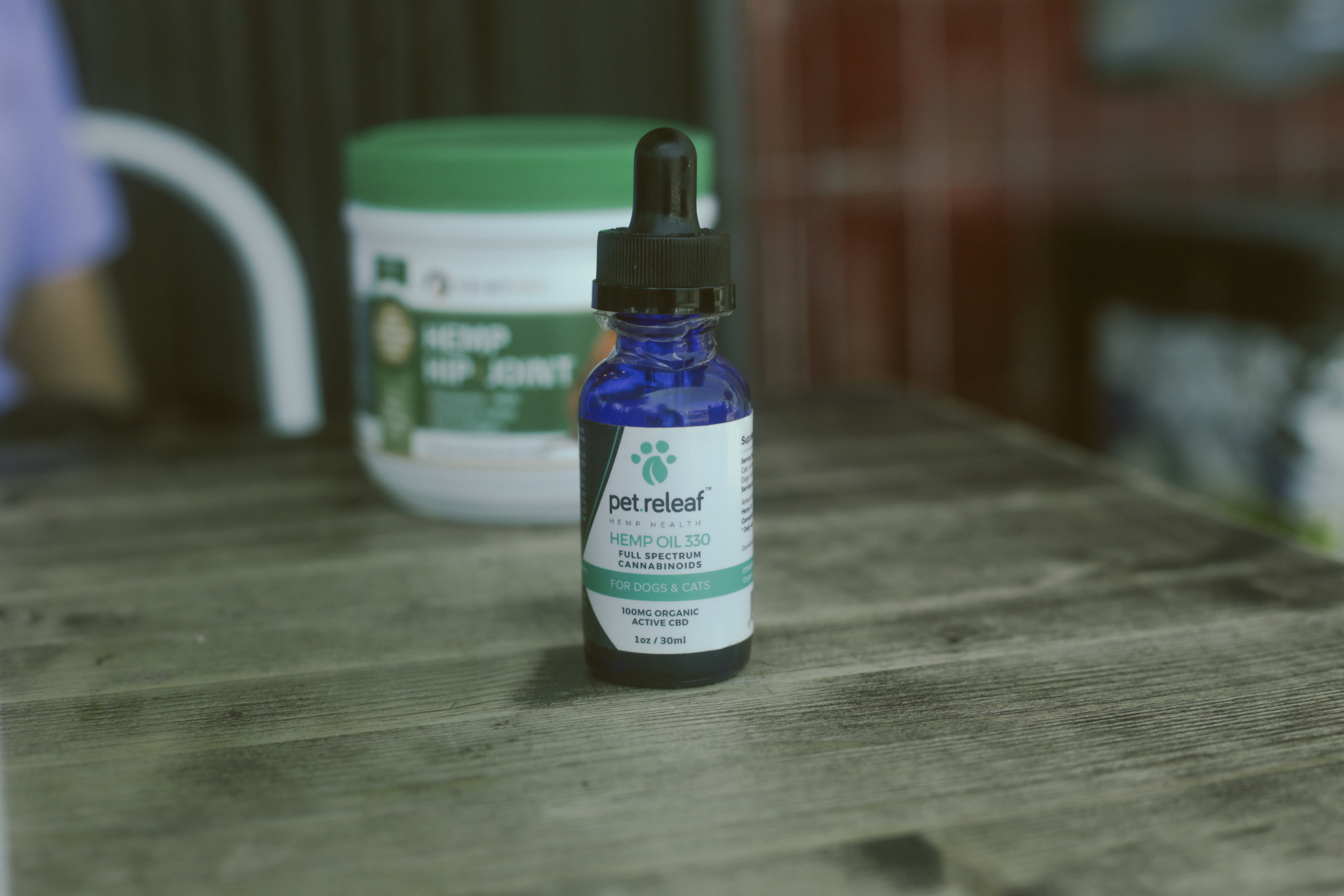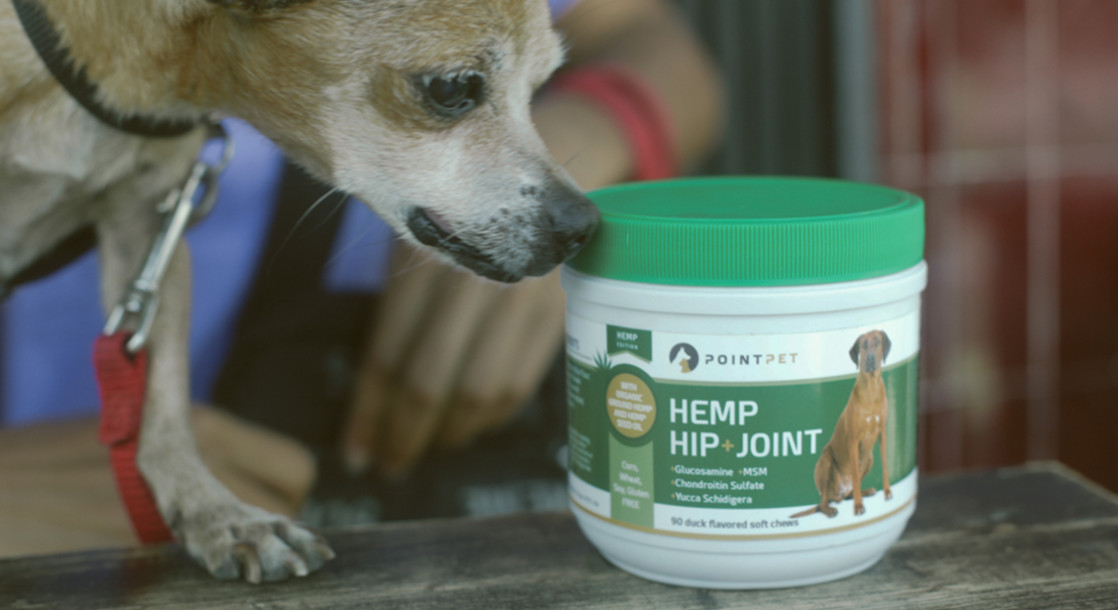Tito, a Chihuahua whose arthritis is treated with cannabis products; photo by Rikki Wright
Whether it’s during the 4th of July to ease their dog’s fireworks-induced anxiety, or to regularly treat the chronic pain that comes with a cat’s arthritis, animal owners are increasingly using cannabis-based products to treat their pets for a menagerie of ailments. Yet, as California state law currently stands, veterinarians are unable to legally discuss marijuana treatments for pets with their clients without risking losing their license to practice veterinary medicine entirely — even despite pot being legal for everyone else but minors in the Golden State. This leaves product selection, dosing, and other health considerations mostly up to a pet guardian’s best guess, creating potential problems for veterinarians, pet owners, and their animals alike.
However newly proposed legislation is seeking to end this tricky predicament: Assembly Bill (AB) 2215 — sponsored by California Veterinary Medical Association and currently being considered in the state legislature — would “protect state-licensed veterinarians from disciplinary action for discussing the use of cannabis on animal patient clients.” In short, vets in California would no longer risk losing their profession for discussing pot products as an option for pet patients.
MERRY JANE spoke with pet owners using cannabis to treat their animals’ health conditions, as well as with veterinarians Drs. Gary Richter and Tim Shu, about how the passage of AB 2215 would positively benefit pets, their human companions, and the animal health experts who treat them.
These interviews have been edited for length and clarity.

Dr. Gary Richter
Dr. Richter is a veterinarian who specializes in integrative healthcare, and is the owner and medical director of Montclair Veterinary Hospital and Holistic Veterinary Care in Oakland, California. I spoke with Dr. Richter, a passionate advocate for treating animals with integrative therapies, about how AB 2215 would affect his patients, and the importance of being able to speak with pet owners about safely using cannabis.
MERRY JANE: How would the passage of AB 2215 positively affect pet owners and your practice?
Dr. Richter: Well, that's a really great question, because the answer to that question has evolved over the past three months because [the language of] AB 2215 has evolved. What used to say that veterinarians can recommend cannabis for veterinary patients has since been changed — “recommend” has been changed to the word “discuss”, which clearly is a bit more vague. If it were to pass, veterinarians would be able to discuss the use of cannabis for veterinary patients, but there would actually be no legally available pet-specific products for [animal doctors to prescribe].
How has your inability to speak about cannabis with patients negatively impacted the health of the pets?
The entire current situation as it pertains to cannabis and veterinarians is greatly to the detriment of animals, because we are not legally allowed to tell you as a pet owner what would be a safe way to use cannabis for your pet. So it would almost be tantamount to somebody telling me, “Well there is this medication that can really help your patients, but you're not allowed to use it, and you're not even allowed to talk about it.” I have had people come into my office with pets that are in pain, or pets that have cancer, or pets that have various diseases — or conversely, I've had people come into my office that are self-medicating their pets with cannabis in ways that are potentially harmful. And the state would tell me that basically my job is to sit on my hands and say nothing.
You mentioned that some people are dosing their pets with cannabis in ways that are harmful. Could you expand on that a little bit?
Sure. Months ago, I had somebody come in with a dog that had cancer. They decided they were going to treat their dog with cannabis, and they went out and got an extremely concentrated high-THC product. And when I saw this dog, it was so stoned that the client had to carry the dog in because he couldn't walk, which is ridiculous.
Currently, without AB 2215, what are you legally allowed to do in that situation?
As a veterinarian, I have two options. I can just say, “You should just stop giving this medication altogether, and don't give your dog cannabis, because the veterinary medical board says it's bad.” And mind you, this dog has cancer. Or, I could risk my license and try to give these people with some guidance in such a way that might give this dog a better quality of life; help him feel a little bit better for however much time he has left. That's the position that the veterinary medical board has put us in.
What are some of the side effects of traditional pet medications versus any side effects of giving a cannabis based-product to your animal?
The side effects of [pharmaceuticals] could be excessive sedation; potential complications as far as liver and kidney health; gastrointestinal upsets. There's a lot of potential complications there. That's certainly not to say that every animal that goes on these medications has these complications, but they are sitting out there. Whereas conversely, when dosed appropriately, cannabis has few, if any, side effects. And certainly nothing from the standpoint of any kind of permanent damage.

Dr. Tim Shu
Dr. Shu is a veterinarian as well the founder and CEO of of VETCBD, a company focused on helping animals through cannabis-based products. I spoke with Dr. Shu about the benefits of being able to speak with pet owners about all of their pets’ medical options, and the possibility of animals overdosing while using marijuana medicine.
MERRY JANE: How does you not being able to talk about cannabis use with pet owners negatively affect animals?
Dr. Shu: To not allow for the discussion of [cannabis use] is to not allow pet owners to have information regarding medicine that could greatly improve the quality of other pets' lives. We've spoken to a lot of pet owners whose pets' lives have been saved by cannabis, because of issues such as uncontrollable seizures or debilitating arthritis. So if information about cannabis isn't available to pet owners, pets are going to suffer from that, and the whole point of healthcare and medicine is to improve the quality of life and alleviate suffering.
Currently, because veterinarians can't legally speak about cannabis use for pets, where are pet owners are getting their information on dosing?
At VETCBD, we provide veterinary-based information online and at conferences, at events and in stores, but we can't reach every pet owner out there. The reality is that when pet owners are unable to speak to their veterinarians about cannabis, they're going to turn to whatever resources are available to them, and this may include people without medical backgrounds like friends or family, or resources online with potentially erroneous information. So that's why it's so important that veterinarians be allowed to speak to pet owners about cannabis: If their veterinarians can't talk to them about it, they'll find someone that will, whether or not that secondary source has reliable, accurate information.
Some opponents of AB 2215 have mentioned they disapprove of the bill because of concerns of animals overdosing on cannabis. Can you touch on the reality of someone giving their animal too much marijuana?
Overdosing, especially when it comes to products that contain THC, is a reality. Animals tend to be more sensitive to THC. So the concern about overdosing using cannabis products not made for pets is a reality that veterinarians have been dealing with, because owners are not getting the information they need from their veterinarians about proper use. By allowing veterinarians to speak to their clients about cannabis, it would prevent improper use of cannabis. The reality is that no one [responsible] is trying to get pets high, and pet owners are always going to do what's in the best interest of their pet, and do whatever they can to improve the quality of their pet's lives.

Liza Dye (photos by Rikki Wright)
Liza is a Los Angeles-based comedian and writer, as well as the owner of two emotional support dogs. She treats Tito, her 12-year-old Chihuahua and Noah, her 8-year-old poodle, with cannabis-infused products to ease their arthritis and anxiety. We spoke with her about the improvements she’s seen in her pets’ lives since she’s began microdosing them with CBD.
MERRY JANE: How did you find out about using cannabis-based products for your dogs?
Dye: Within the last 5 to 7 years, it's been this new thing that everyone's been talking about… I just kind of always knew about it. I was in South Carolina when it first became a thing, and it was not available there. That was one of the reasons I moved to California, so that I would have access to more holistic medical solutions.
Tell us about your pets, what products you use with them, and why.
I have a senior Chihuahua who has really, really bad arthritis, and I have a young poodle who has really bad anxiety… He's terrified of everything, so I give him a little bit of CBD for that. And then the Chihuahua, he has really bad arthritis, and he's also going a little blind. He's just very old, so I just try to really try to make his last days as least painful as they possibly can be. The Chihuahua's had a miraculous turnaround with CBD. He couldn't climb stairs or anything without wailing in pain, and I've been giving him a small dose of CBD every other night, and now he can climb two flights of stairs! He couldn't climb a single stair before, so that really blew my mind.

How do you think being able to talk to a vet about cannabis and proper dosing would impact your pets' health?
Oh my God, it would help tremendously, because I think most dog parents unfortunately make the mistake of overdosing over underdosing when you're first trying to figure it out. I think if there was a professionally trained medical physician that knew specifically about my individual dog's needs, it would have helped so much, especially in the beginning when I was trying to figure it all out.

Yvette Ward (photos by Rikki Wright)
Yvette Ward is a Los Angeles-based model and blogger, and the owner of Charlie, a one-and-a-half-year-old Maltipoo. We spoke with Yvette about how she effectively treats Charlie’s anxiety and how she found out about using cannabis-based products on her pet.
MERRY JANE: Tell us about your dog and why you use cannabis-based products on him.
Ward: My dog’s name is Charlie, he’s a Maltipoo, and I use calming chews to calm him down from flights, because we fly a lot, so I give it to him before we go and it calms his anxiety.
How did you find out about cannabis-based products and using them for pets?
One of my friends is an influencer and had an event with a company, Eaze, and they taught us about cannabis. They said a lot of people use these things for their pets, and they had pet-specific products. So I ordered the chews to see how it worked.

Have you noticed a difference in Charlie since using the cannabis-based products for flying?
Yeah, I call him a watchdog because he’s kind of always on guard, so it kind of just puts him at ease. It calms his nerves and he’s not looking around and shaking as much.
How do you think your dog would benefit from you being able to speak with a veterinarian about dosing him with cannabis?
I feel like there some things we still don’t know, and you don’t want to give your pet the wrong thing. If his veterinarian is knowledgeable on it, that would obviously help. It would help to know just how much you can give him, and to have someone just to base it on your pet and not just what it says on the label.












